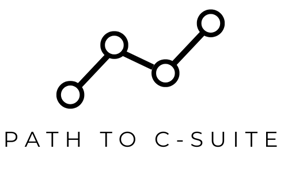Achieve Your C-Suite Dreams with Online Training
Path to C-Suite offers comprehensive online training and executive coaching to help you realize your dreams of landing a c-suite job. Unlock your potential and advance your career today!
1/25/20254 min read


Understanding the C-Suite Landscape
The C-Suite, encompassing executive-level roles such as Chief Executive Officer (CEO), Chief Financial Officer (CFO), Chief Operating Officer (COO), and Chief Marketing Officer (CMO), plays a pivotal role in shaping an organization’s strategic direction and operational success. These positions are not only essential for the management of day-to-day operations but also for steering the company through market challenges and innovations. The importance of senior leadership positions in any business cannot be overstated, particularly as organizations navigate an increasingly complex business environment.
Securing a role within the C-Suite is inherently competitive; candidates must distinguish themselves through a combination of extensive experience, proven leadership skills, and industry-specific expertise. Companies typically seek executives with a track record of achieving business objectives, demonstrating adaptability, and fostering a culture of innovation and collaboration. Additionally, possessing strong communication skills is crucial, as C-Suite executives must articulate their vision clearly to various stakeholders, including employees, board members, and investors.
Alignment of personal career goals with industry demands is equally vital. Aspiring C-Suite executives benefit from understanding emerging industry trends, as well as the specific qualifications that organizations prioritize during the hiring process. This knowledge helps candidates tailor their experiences and skills to meet these evolving expectations. Moreover, in the increasingly crowded job market, the fear of being outpaced by equally qualified candidates can be daunting. Recognizing this competitive landscape encourages potential executives to invest in continuous personal development and networking, ensuring they remain relevant and appealing to potential employers.
Continual Development: Investing in Your Skills
In the competitive landscape of C-Suite executive roles, continual professional development is not merely advantageous; it is essential. Aspiring executives must actively seek to improve their knowledge and skills through various avenues, including advanced degrees, certifications, and other learning opportunities. For instance, pursuing an MBA or specialized executive programs can significantly enhance one's business acumen and strategic thinking abilities, facets that are invaluable for effective leadership.
Certifications in leadership, project management, or industry-specific topics also demonstrate a commitment to professional growth. Notably, credentials such as Certified Executive Coach or Project Management Professional (PMP) can set candidates apart in the highly competitive job market. These qualifications underscore a candidate's dedication to mastering the complexities of corporate management and operations.
Lifelong learning is crucial in adapting to the fast-evolving corporate environment. As industries embrace technological advancements and shifting market dynamics, C-Suite executives are expected to stay ahead of these trends. Engaging in periodic training workshops, attending industry conferences, or participating in online courses can exponentially broaden one's understanding and capability to lead in an ever-changing corporate landscape. Failure to invest in such personal development may result in stagnation, rendering even the most experienced professionals obsolete amidst rapid changes.
Moreover, mentorship and networking can play complementary roles in an executive’s growth. Building relationships with industry leaders can provide valuable insights and opportunities for advancement. In essence, by prioritizing continual development, aspiring C-Suite executives can not only equip themselves with the necessary attributes to excel in high-level positions but also ensure their career trajectories remain progressive and aligned with industry advancements.
The Power of Executive Coaching
Engaging with an executive coach can significantly influence an individual's journey toward securing a C-suite position. The benefits of executive coaching extend beyond mere skill enhancement; they encompass a comprehensive approach to personal and professional growth. By working closely with an experienced coach, candidates can refine their leadership skills, thereby bolstering their effectiveness as future executives.
One of the primary advantages of executive coaching is the tailored guidance it offers. Coaches assess specific strengths and weaknesses, enabling individuals to develop targeted skills crucial for high-impact decision-making. These decisions often involve navigating complex organizational challenges, and the ability to make sound judgments under pressure distinguishes successful executives. Furthermore, a coach can provide constructive feedback, allowing candidates to improve their critical thinking and strategic planning capabilities, both of which are essential for C-suite roles.
Another significant aspect of executive coaching is the enhancement of executive presence. In today's competitive job market, demonstrating confidence and charisma is vital for those seeking C-suite opportunities. Coaches help individuals articulate their vision, effectively communicate with stakeholders, and exude the gravitas expected of top-level leaders. This development of executive presence not only prepares candidates for interviews but also equips them to excel once in their roles.
Various coaching services are available, ranging from one-on-one sessions to group workshops, focusing on different aspects of leadership and executive performance. Some coaches specialize in key areas, such as emotional intelligence or conflict resolution, which can further help candidates stand out in the recruitment process. By investing in executive coaching, individuals position themselves more favorably in the competitive landscape of C-suite job opportunities.
Strategizing Your Job Search: Networking and Branding
Embarking on a job search for a C-Suite executive position necessitates a well-planned strategy, particularly in the realms of networking and personal branding. Successful candidates often highlight the importance of cultivating a robust professional network that facilitates introductions to key decision-makers and industry leaders. Networking should not be seen as merely transactional; instead, it is about building genuine relationships that can mutually benefit all parties involved. Attend industry conferences, participate in relevant seminars, and consider joining executive associations to meet others in your field.
Moreover, leveraging platforms such as LinkedIn can greatly enhance your visibility and professional presence. In today’s digital age, maintaining an engaging LinkedIn profile is crucial for aspiring C-Suite executives. Focus on articulating your unique value proposition clearly and effectively. Regularly share insights, achievements, and thought leadership content to establish yourself as a knowledgeable figure in your industry. Engage with posts from your connections to foster a sense of community, which can lead to invaluable referrals down the line.
In addition to networking and online presence, creating a personal brand that resonates with your career ambitions is essential. Your brand should reflect not just your skills and accomplishments, but also your leadership philosophy, vision, and values. This brand identity will be pivotal during interviews and discussions as it informs potential employers about your fit with their organizational culture and goals.
It is common for candidates to experience anxiety regarding competition when aiming for C-Suite roles. However, proactively addressing these fears can significantly alter your job search experience. Focus on your unique qualifications and the contributions you can provide, rather than merely comparing yourself to others. Engaging with current executives through informational interviews can provide valuable insights and alleviate fears about the unknown. By actively participating in your industry and promoting your personal brand, you position yourself as a top candidate in the competitive landscape.
Contact & About
Newsletter
© 2025. All rights reserved.
Legal
About Us


